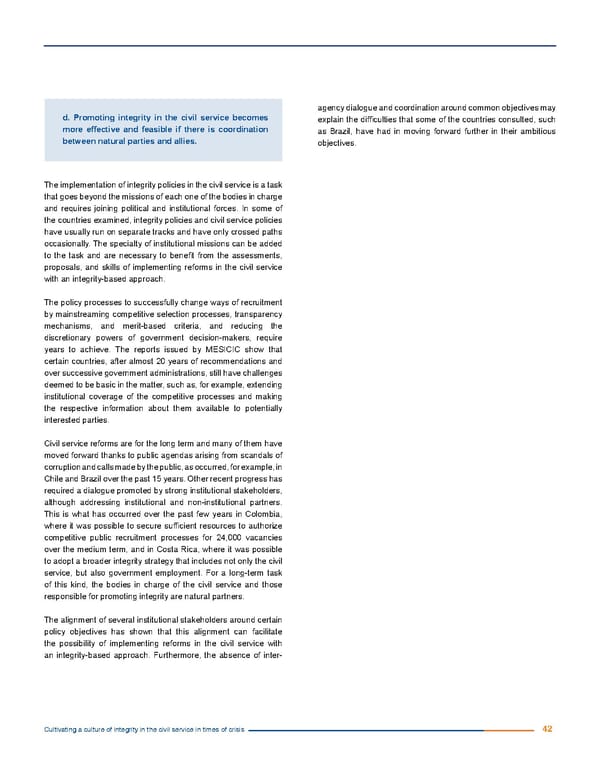agency dialogue and coordination around common objectives may d. Promoting integrity in the civil service becomes explain the difficulties that some of the countries consulted, such more effective and feasible if there is coordination as Brazil, have had in moving forward further in their ambitious between natural parties and allies. objectives. The implementation of integrity policies in the civil service is a task that goes beyond the missions of each one of the bodies in charge and requires joining political and institutional forces. In some of the countries examined, integrity policies and civil service policies have usually run on separate tracks and have only crossed paths occasionally. The specialty of institutional missions can be added to the task and are necessary to benefit from the assessments, proposals, and skills of implementing reforms in the civil service with an integrity-based approach. The policy processes to successfully change ways of recruitment by mainstreaming competitive selection processes, transparency mechanisms, and merit-based criteria, and reducing the discretionary powers of government decision-makers, require years to achieve. The reports issued by MESICIC show that certain countries, after almost 20 years of recommendations and over successive government administrations, still have challenges deemed to be basic in the matter, such as, for example, extending institutional coverage of the competitive processes and making the respective information about them available to potentially interested parties. Civil service reforms are for the long term and many of them have moved forward thanks to public agendas arising from scandals of corruption and calls made by the public, as occurred, for example, in Chile and Brazil over the past 15 years. Other recent progress has required a dialogue promoted by strong institutional stakeholders, although addressing institutional and non-institutional partners. This is what has occurred over the past few years in Colombia, where it was possible to secure sufficient resources to authorize competitive public recruitment processes for 24,000 vacancies over the medium term, and in Costa Rica, where it was possible to adopt a broader integrity strategy that includes not only the civil service, but also government employment. For a long-term task of this kind, the bodies in charge of the civil service and those responsible for promoting integrity are natural partners. The alignment of several institutional stakeholders around certain policy objectives has shown that this alignment can facilitate the possibility of implementing reforms in the civil service with an integrity-based approach. Furthermore, the absence of inter- Cultivating a culture of integrity in the civil service in times of crisis 42
 Cultivating a culture of integrity in the civil service in times of crisis. Page 49 Page 51
Cultivating a culture of integrity in the civil service in times of crisis. Page 49 Page 51